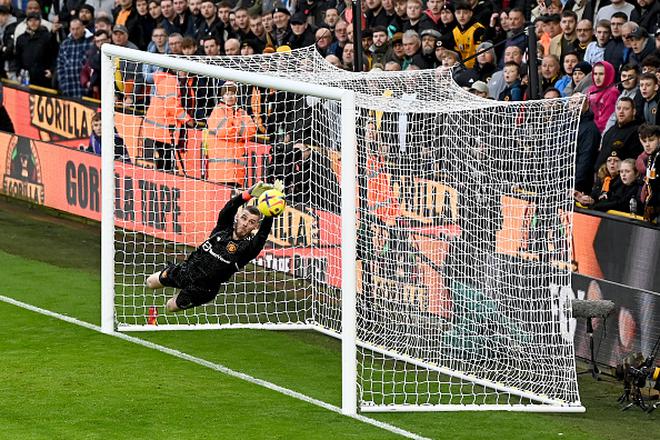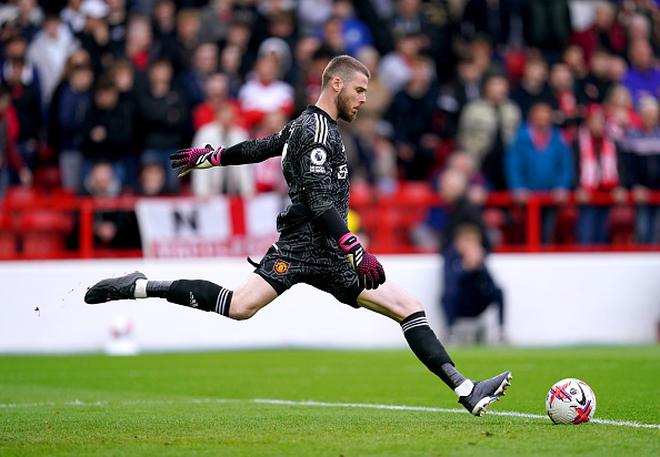In the 12 seasons that David de Gea served as Manchester United’s No. 1 between the sticks, the role of the goalkeeper — or at least the manner in which it is interpreted by elite teams coached by cutting-edge tacticians — appears to have evolved beyond him.
Manchester City manager Pep Guardiola, analysing Inter Milan ahead of the Champions League final last month, spoke of how his team’s pressing scheme would have to change from the one used against United in the FA Cup.
“When you have a keeper, [Andre] Onana, it is difficult to make a high press properly because you cannot press a keeper like that,” he said. “It’s different [from] United, for instance.” Notably, Onana’s footwork and passing were repeatedly cited by Guardiola among Inter’s key strengths.
At his best, De Gea was a match-winning shot-stopper with the agility and speed of reaction to pull off astounding saves. In recent years, however, he has looked like a player out of his time as football has demanded more from keepers, with City and Liverpool two standout examples of how the position has been transformed.

The new-age keeper
England’s two most dominant teams of the past five years have been built on the ball-playing qualities of their keepers. Ederson, at City, and Alisson, at Liverpool, look as comfortable with the ball at their feet as they do with their hands. Their composure in possession and the precision of their passing add another dimension to their teams.
They are effectively an 11th outfield player at times and it can feel like their teams have an extra man in defence with their ability to step out of goal and double up as a sweeper when required. Their long-range passing can be a valuable weapon in attack, but it is more their prowess in building out from the back that is fundamental to the style played by Guardiola and Jurgen Klopp.
United has not had that option with De Gea in goal and increasingly there has been a sense that it has held the team back in attempts to modernise its play. While United has had some success with the Spaniard, its level has not come close to reaching the heights of City or Liverpool.
Under former managers Jose Mourinho and Ole Gunnar Solskjaer, the demands on De Gea’s footwork were not so intense. But Erik ten Hag wants his keeper to be involved in the play and United’s evolution under the Dutch manager has felt stifled as a result of De Gea’s limitations.
So it is not surprising that De Gea is leaving Manchester, even if the nature of his exit raised questions about whether it was handled well. The 32-year-old’s deal — which made him the world’s highest-paid keeper when he signed it in 2019 — expired on June 30 but at the time the club said it was still in discussions over an extension.
That followed reports that De Gea had signed a contract extension only for the club to withdraw that offer and come back with reduced terms. Eventually, the goalkeeper announced his exit on social media, taking control of the messaging, with United playing catch-up.

End of an era
The Spaniard’s departure marks the end of an era — there are no players left at Old Trafford who have won the Premier League, with the last title success coming in Alex Ferguson’s final season in charge (2012-13) — but it also deepens the bittersweet flavour of his time at United.
Signed by Ferguson from Atletico Madrid in 2011, De Gea came into a United side that had the quality to compete at the top end but was no longer dominant. An overwhelming majority of his 545 appearances came, however, in United’s long post-Ferguson slump. In his 12 years with the Red Devils, he kept 190 clean sheets — the most shutouts in United’s history — and won the FA Cup, two League Cups and the Europa League in addition to his solitary league title.
Crowned players’ and fans’ player of the year four times, De Gea’s legacy at United is not one of a goalkeeper whose work paved the way for defining success but one of a custodian who, at his finest, saved his team’s blushes, keeping it in matches it had no right to be in.
When he was on his game, he looked unbreachable — in one astonishing performance against Arsenal in late 2017, he made a joint-record 14 saves. While his ability to command his area and deal with high balls were always under scrutiny, he certainly improved in those aspects to deal with the more physical style of football in England.
Was he a great goalkeeper or a goalkeeper who made great saves? There were periods during his time in United when he truly was a great goalkeeper, at least in the traditional sense of the term; but even during his lowest moments, he retained the ability to summon a great save.
“Manchester will always be in my heart, Manchester has shaped me and will never leave me ”DE GEA
Where it went wrong
But two things combined to reduce the security of De Gea’s United tenure.
One, his shot-stopping consistency reduced. The games against West Ham last season offer an illustration of this: in the home match last October, he played a starring role in a vital victory, producing at least three match-winning stops. But his blunder in the reverse fixture this year — he let a tame shot from Said Benrahma squirm past him in a loss — was his fourth error leading to a goal in all competitions in 2022-23 at that point, the joint-most of any Premier League player.
Two, De Gea’s risk-averse nature, which served him so well in the traditional aspect of the role, restricted him with the ball at his feet. His distribution put his teammates under pressure and although he noticeably got better, it still wasn’t to a standard Ten Hag demanded.
So with his strongest suit — the ability to keep the ball out of the back of his net — no longer as reliable as it once was and his weakness on the ball limiting ten Hag’s preferred style, the end was near. De Gea leaves United as a club legend, but his exit also makes space for a transition that many fans feel is long overdue. It gives Ten Hag the chance to bring in a keeper — the Guardiola-approved Onana — that could prove transformational.
For all of De Gea’s excellent qualities, sparking a revolution was beyond him.







